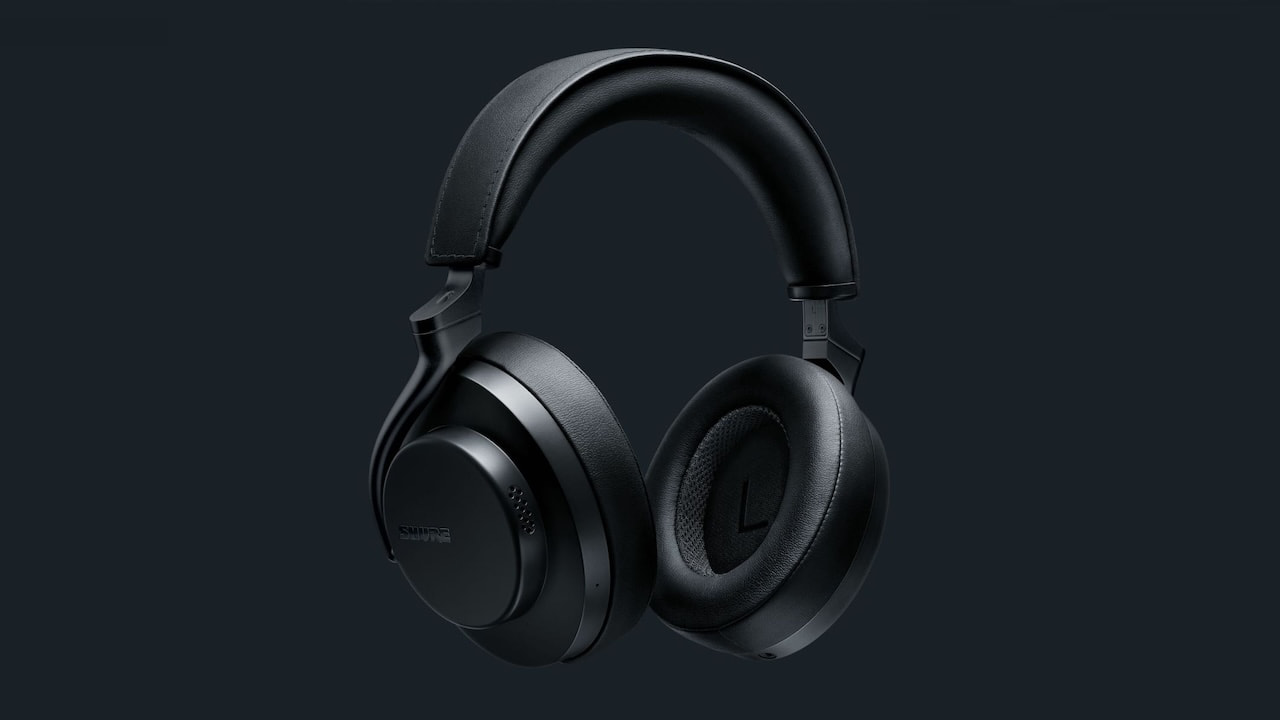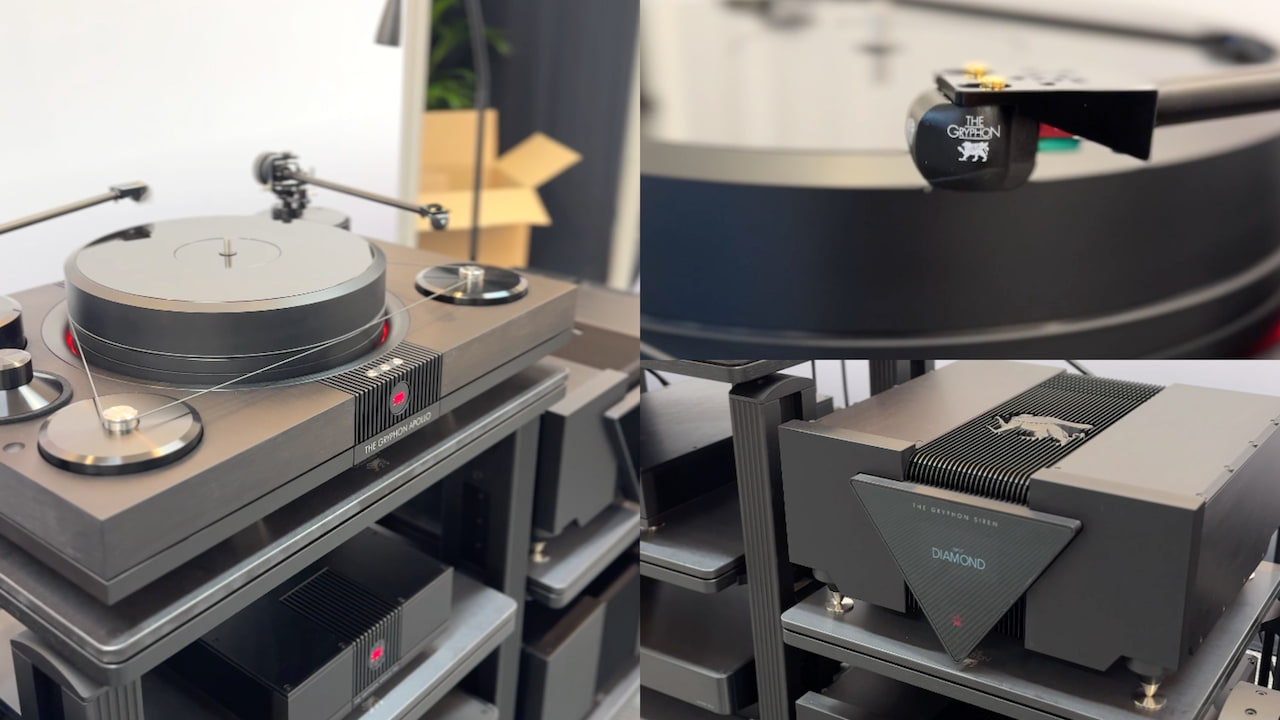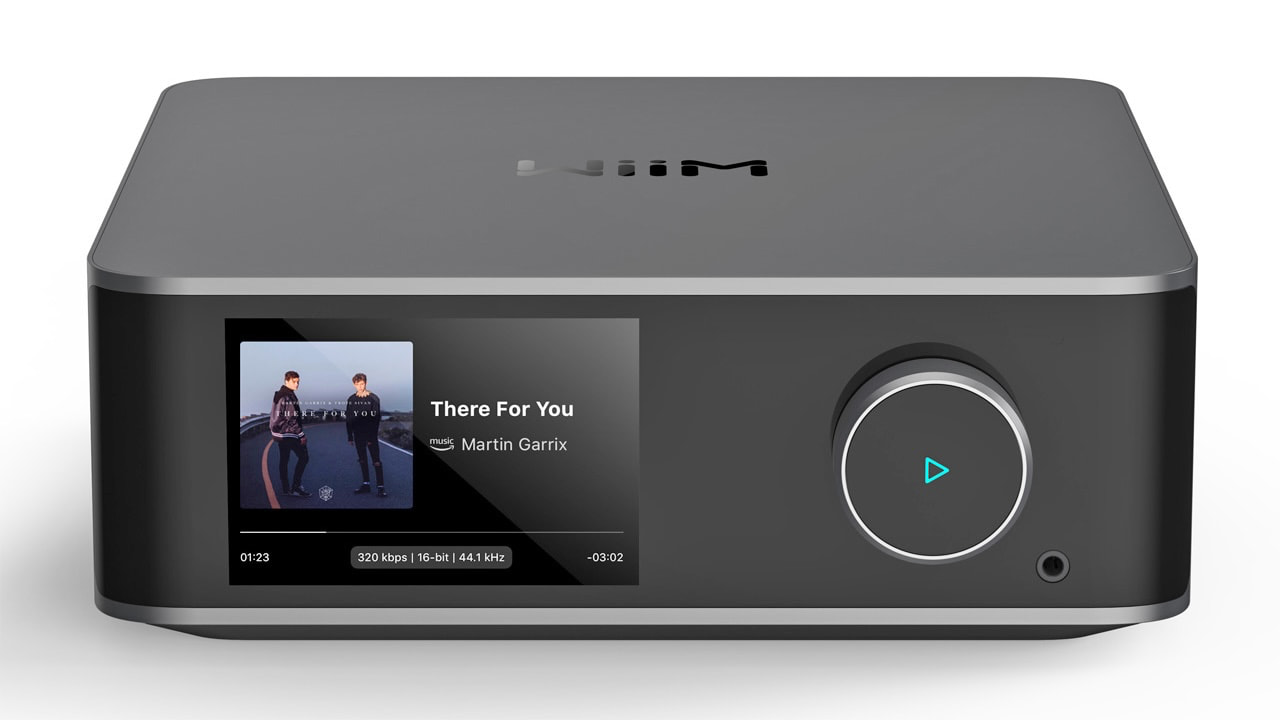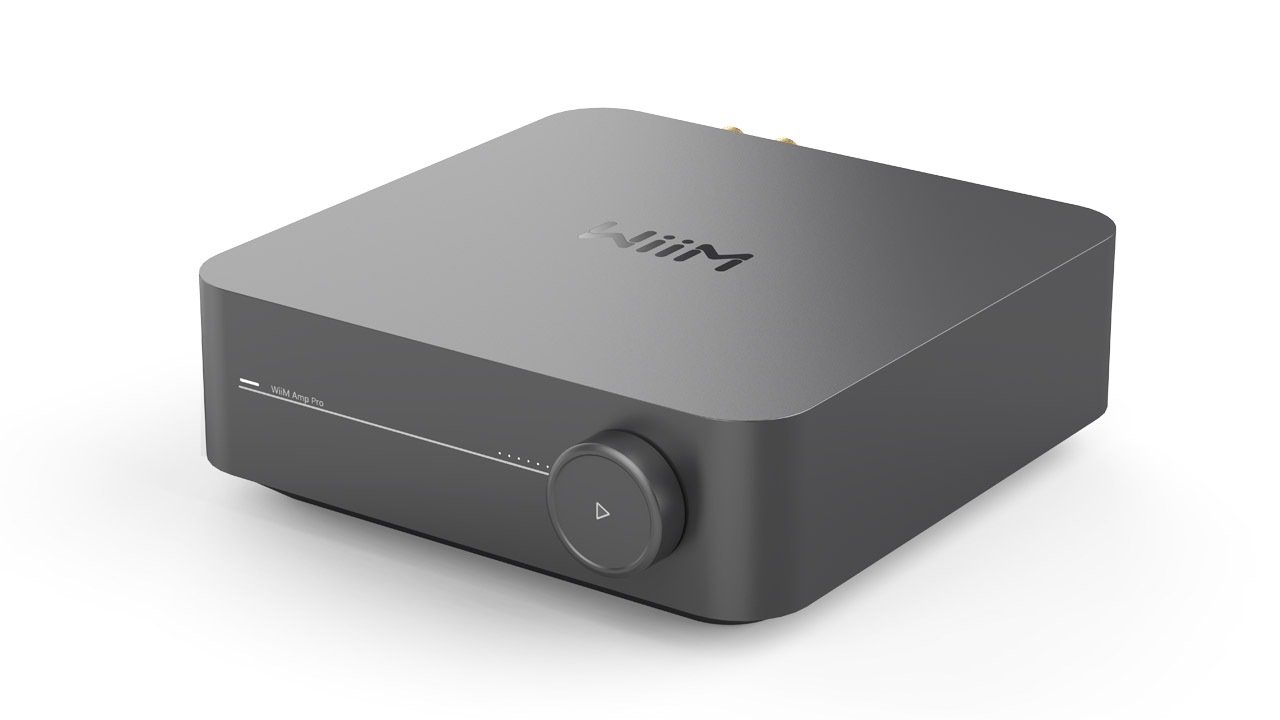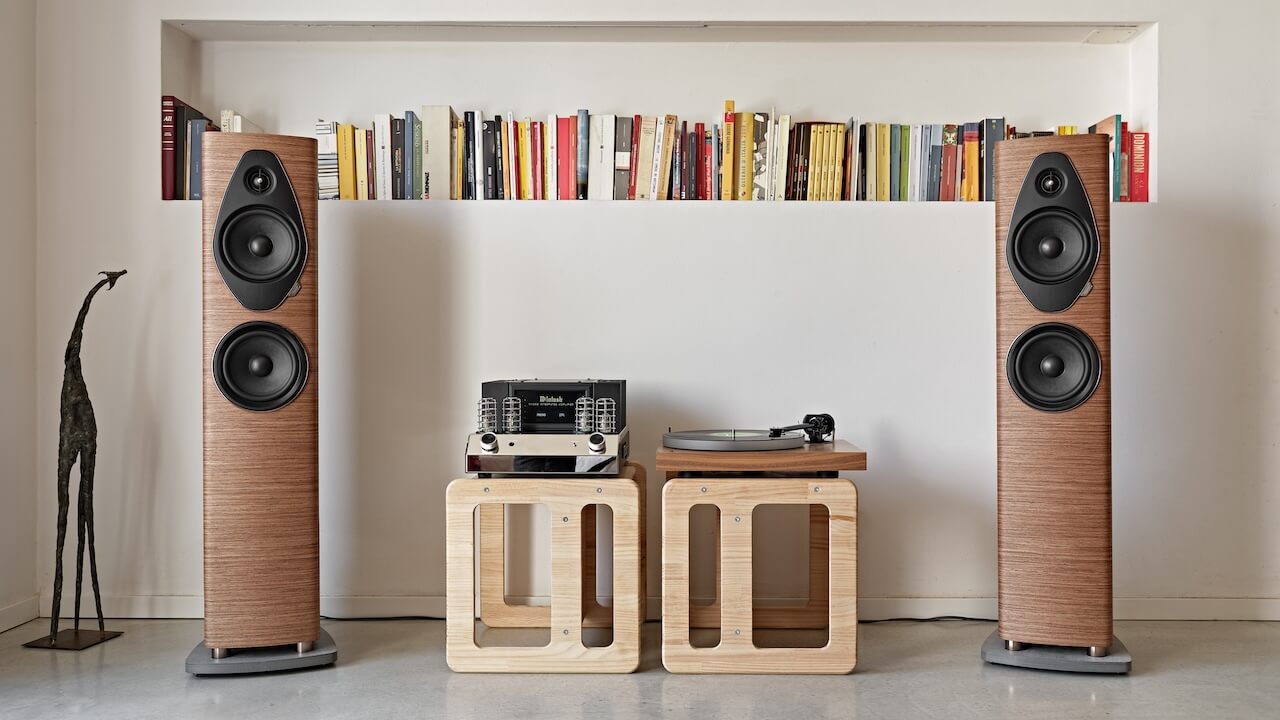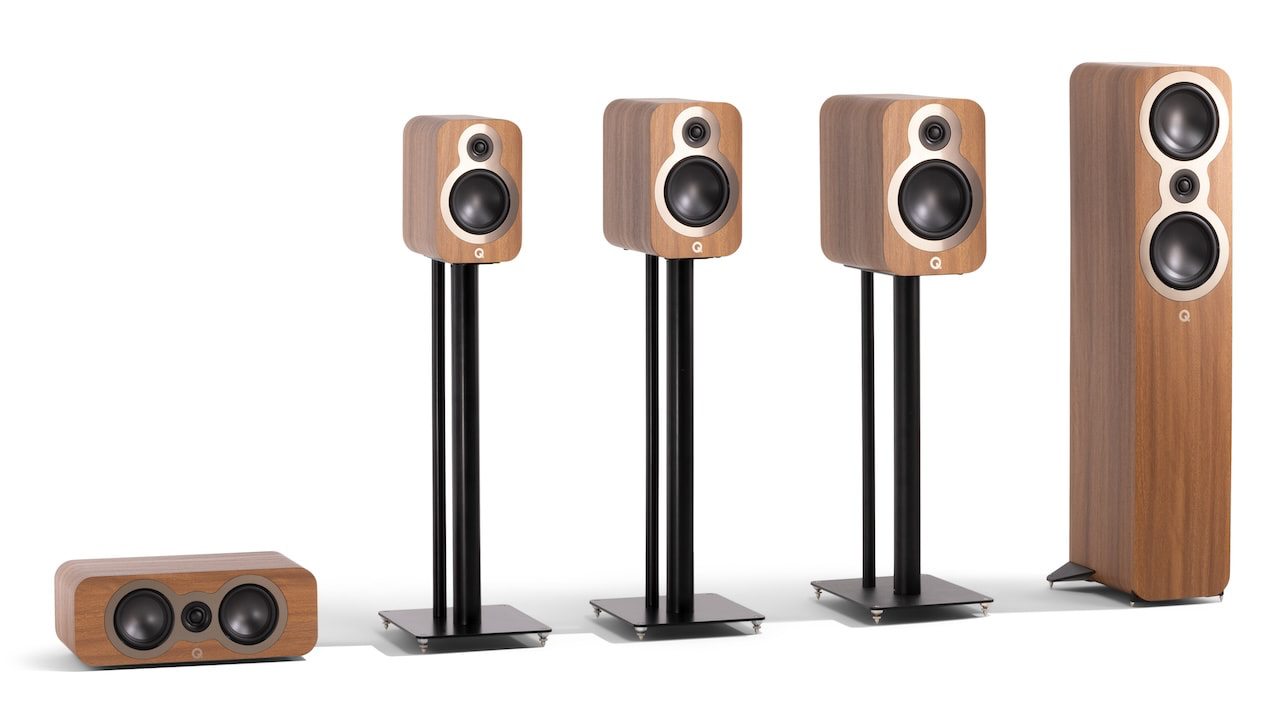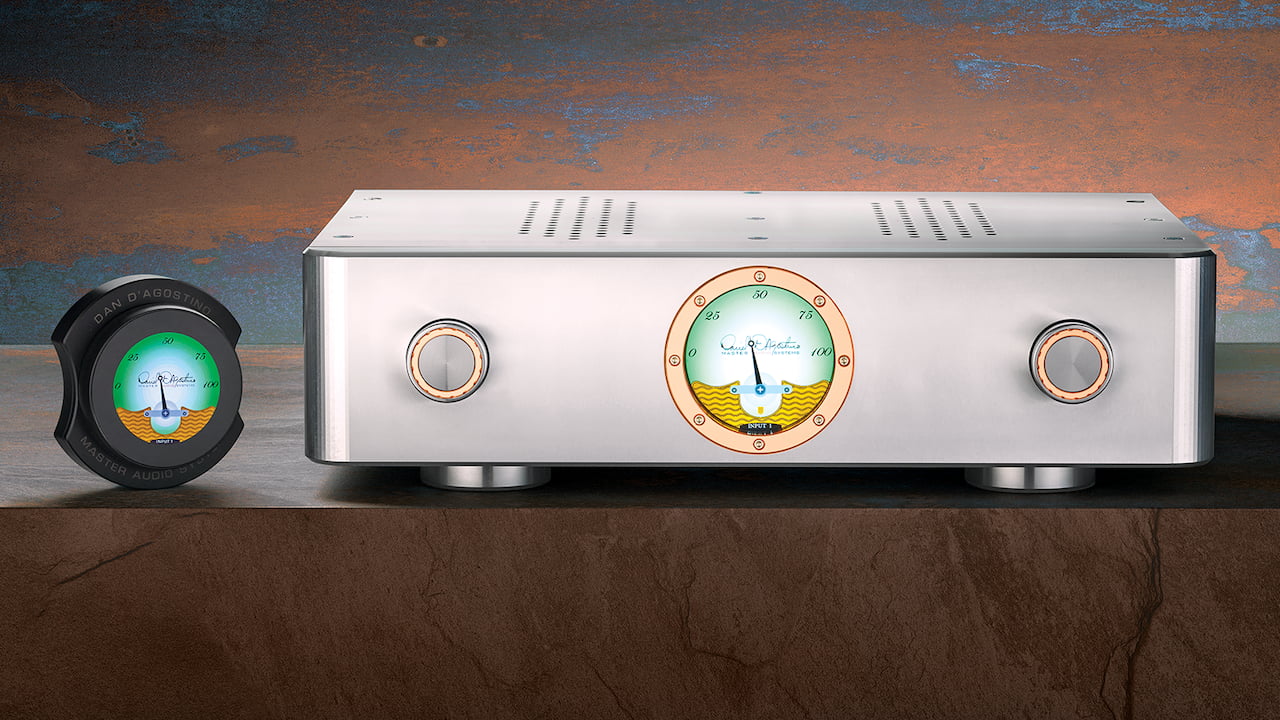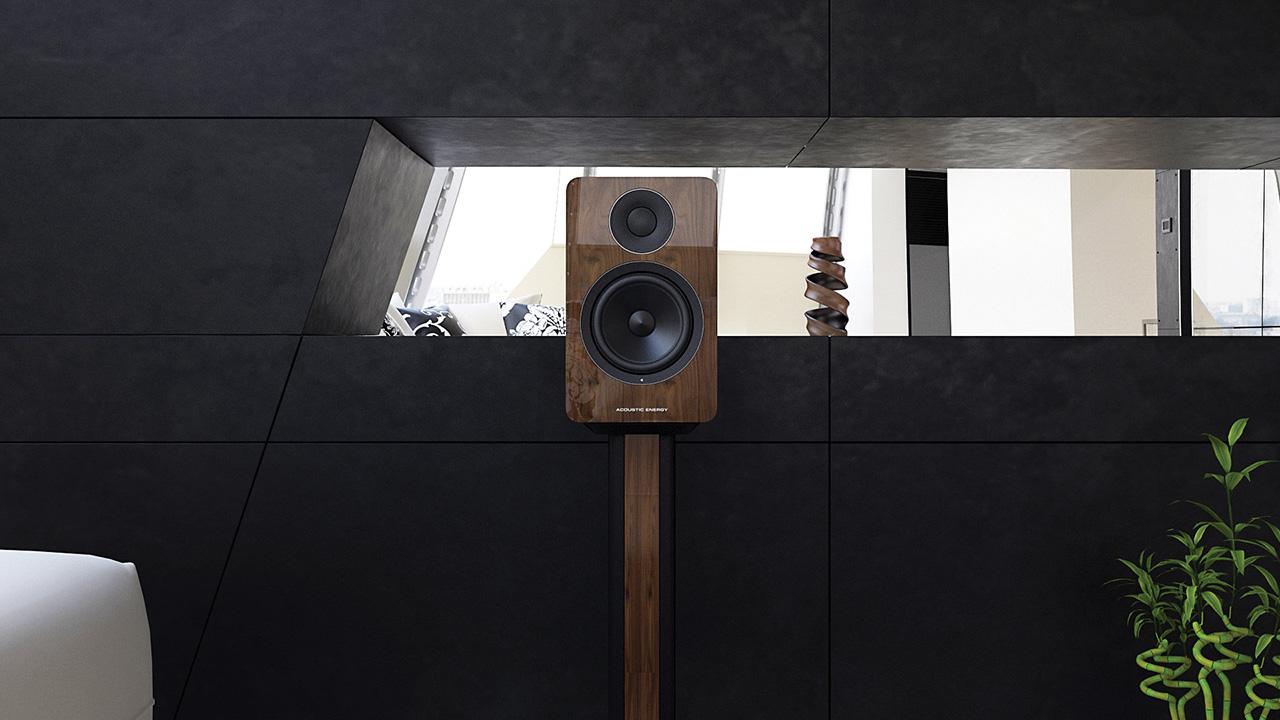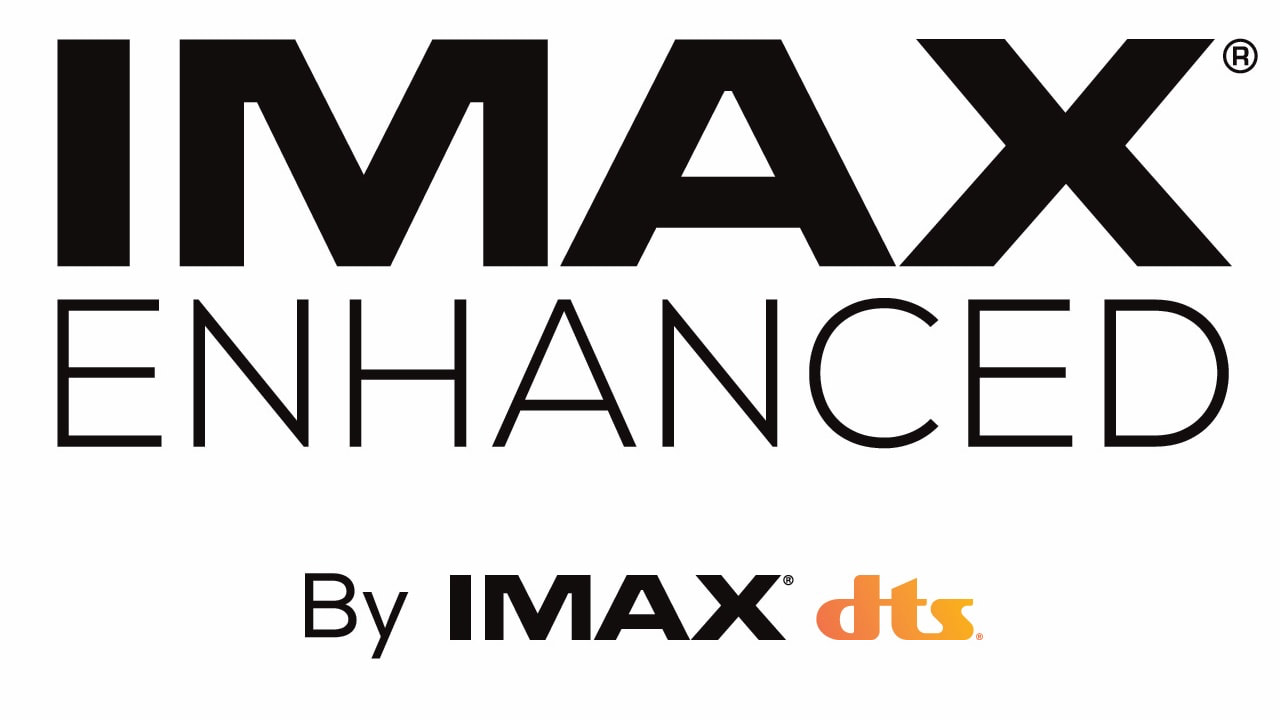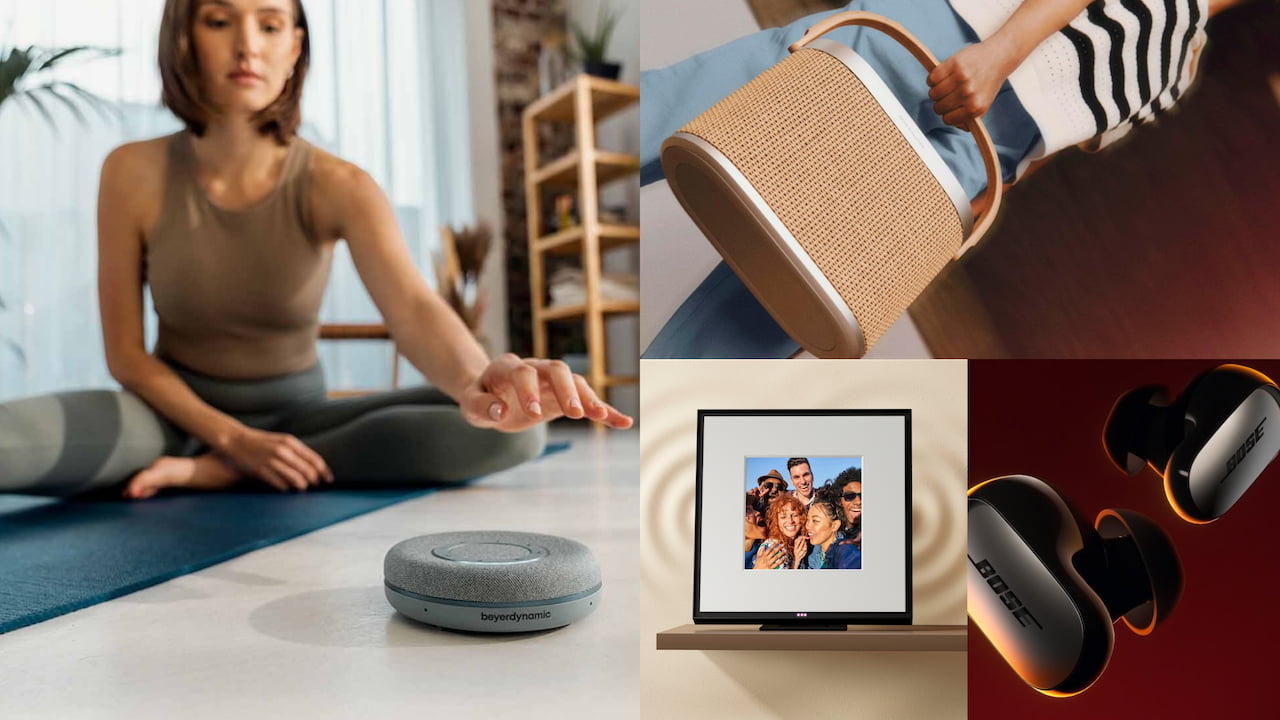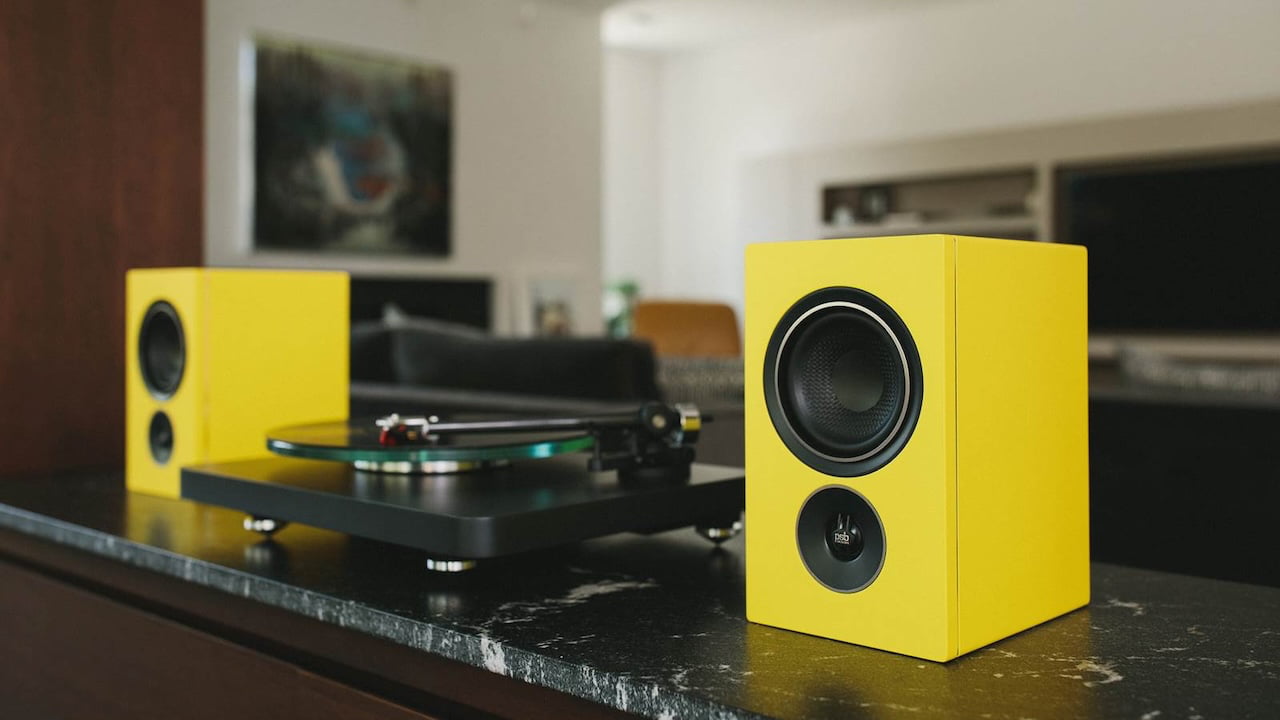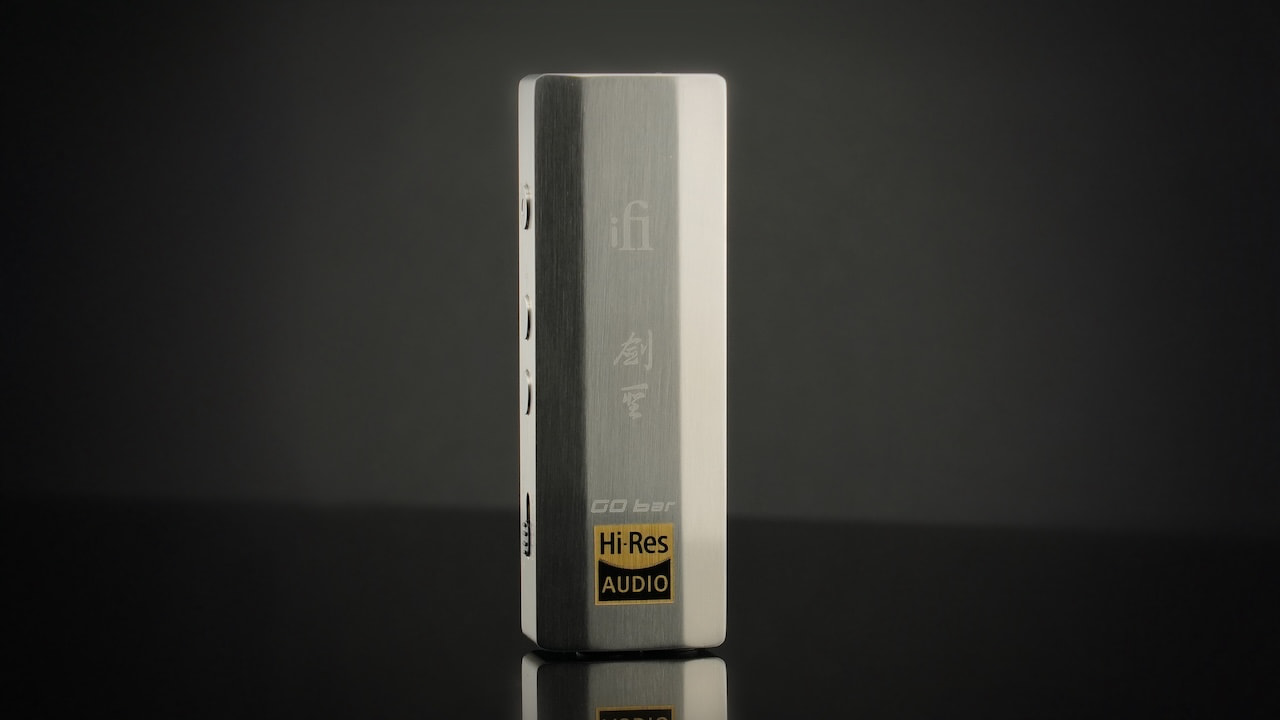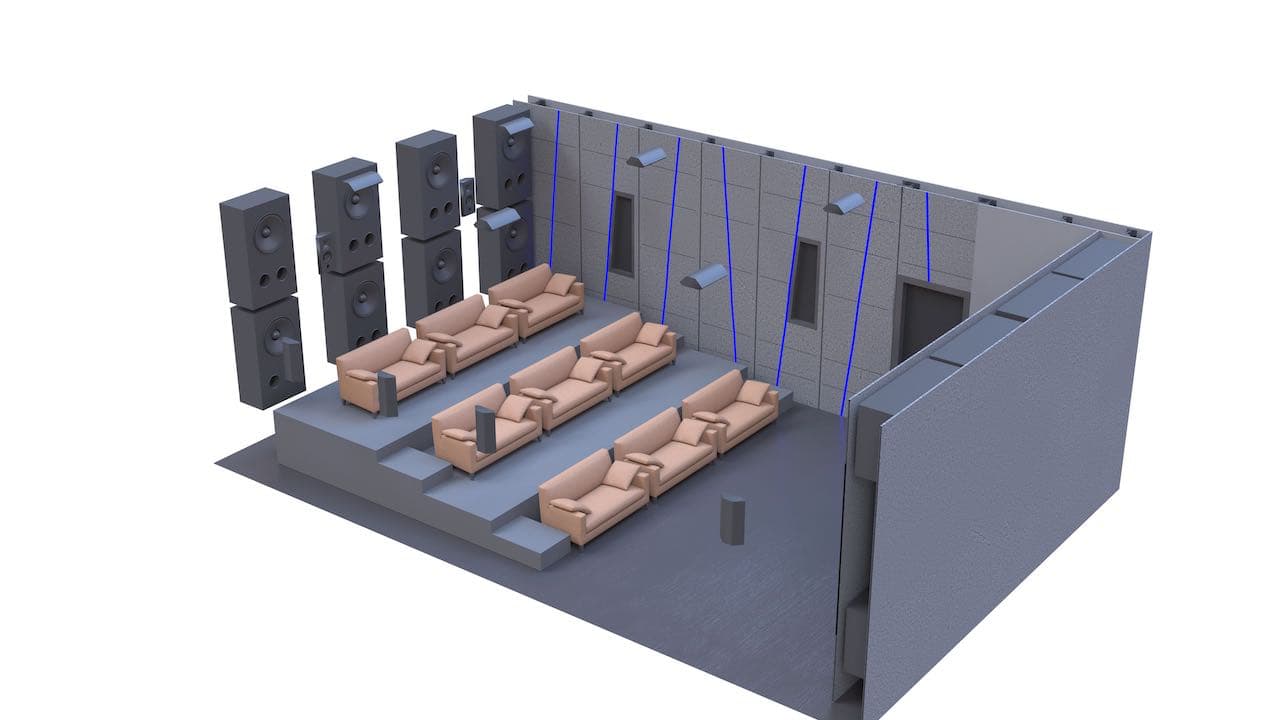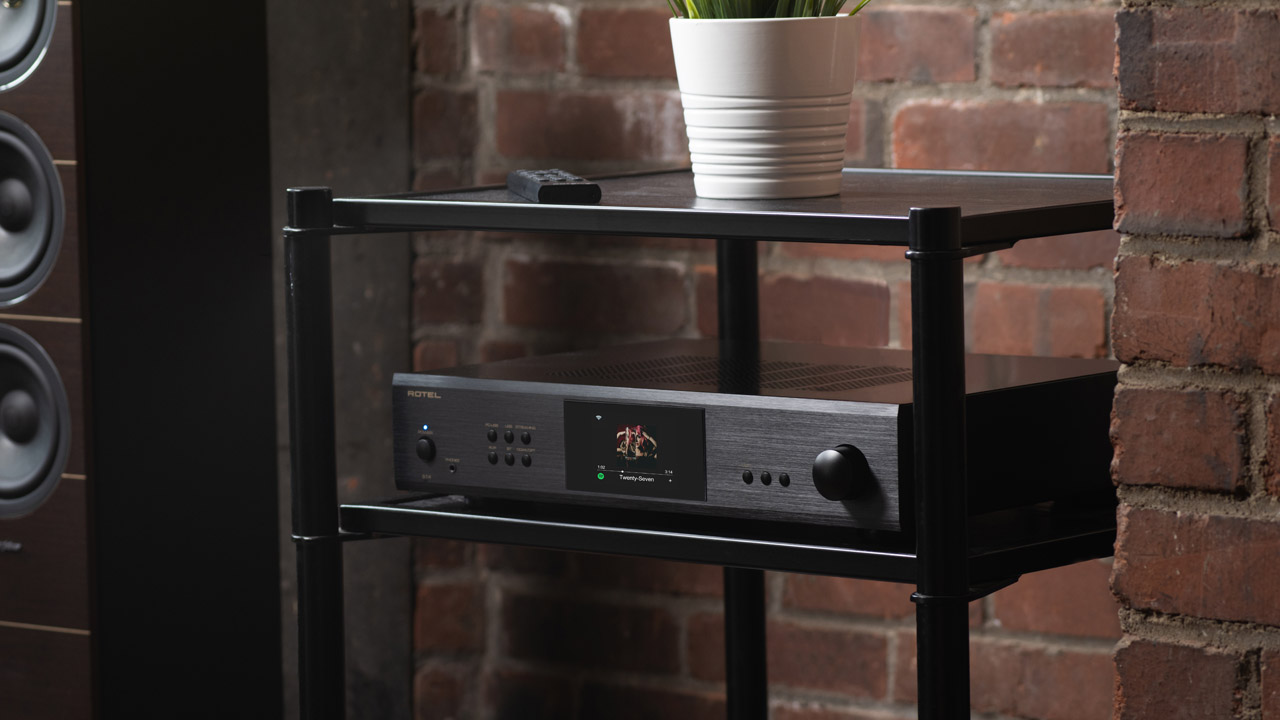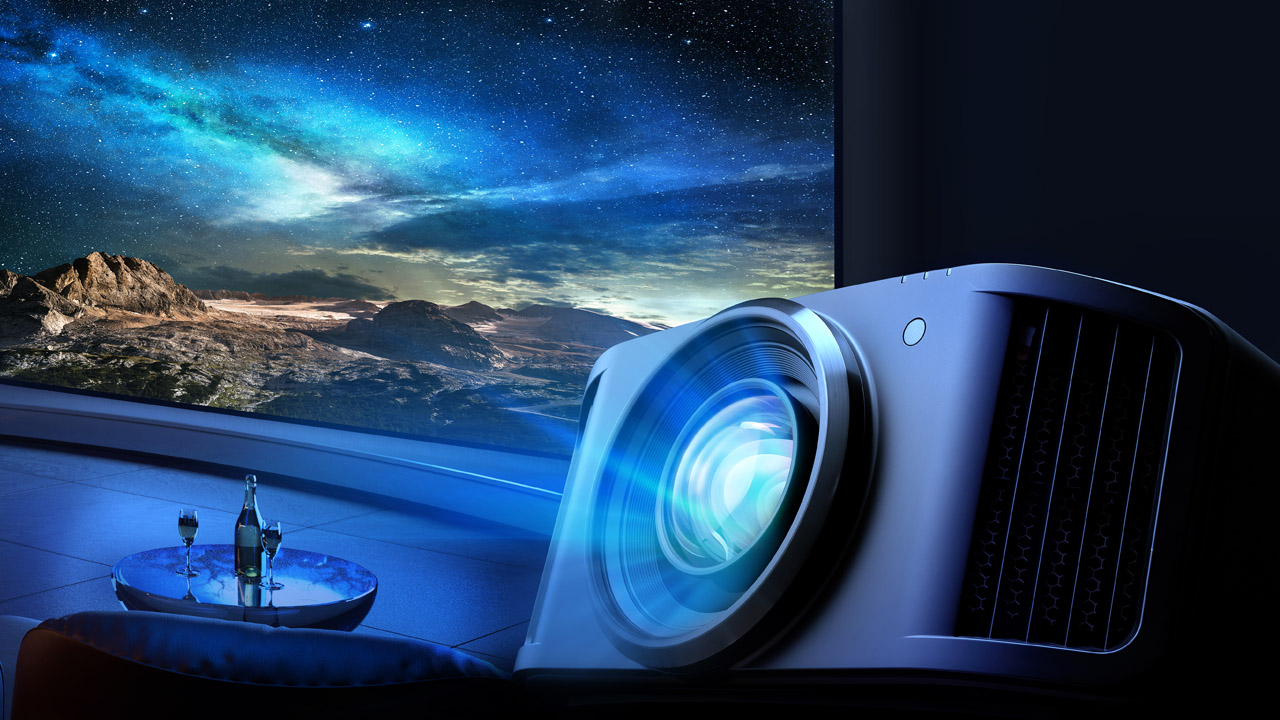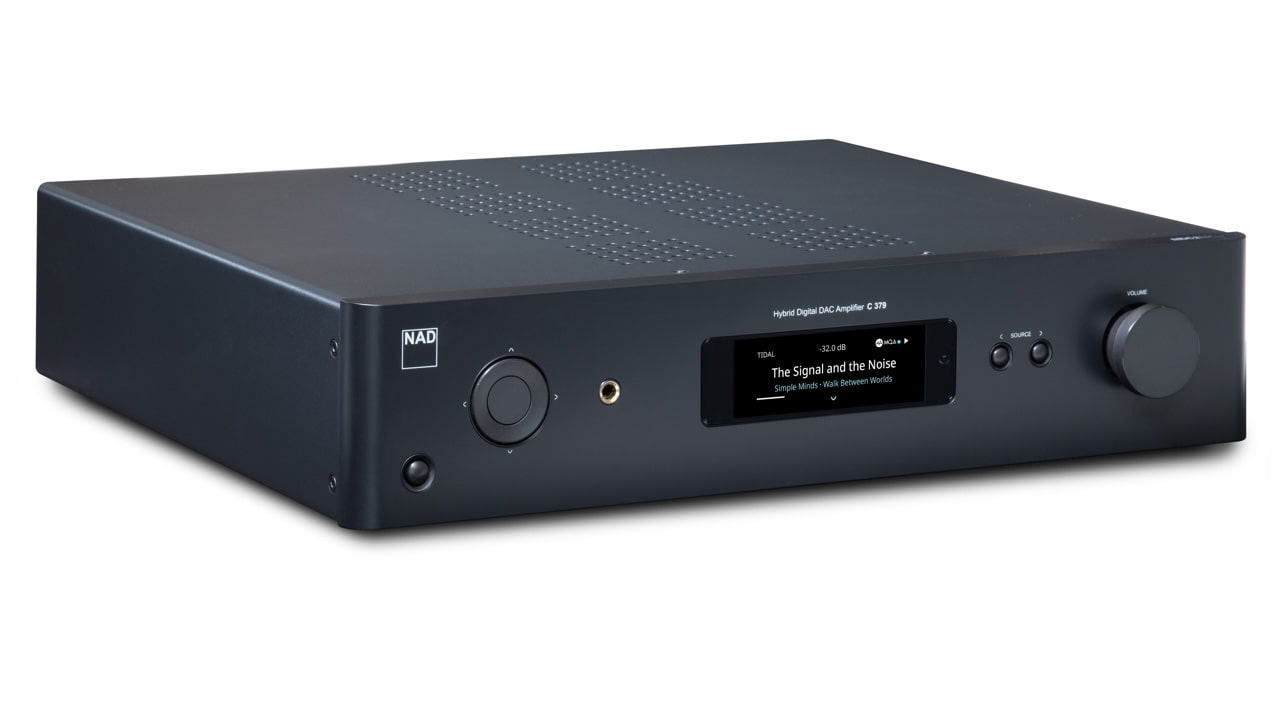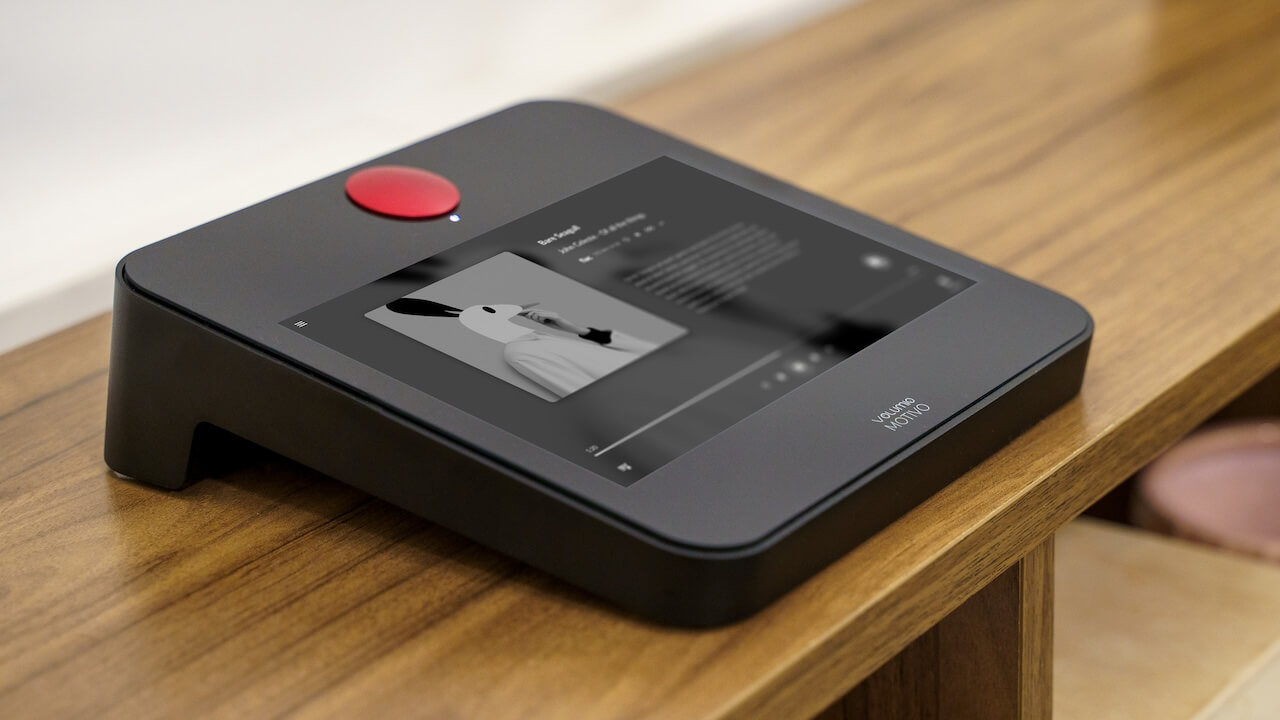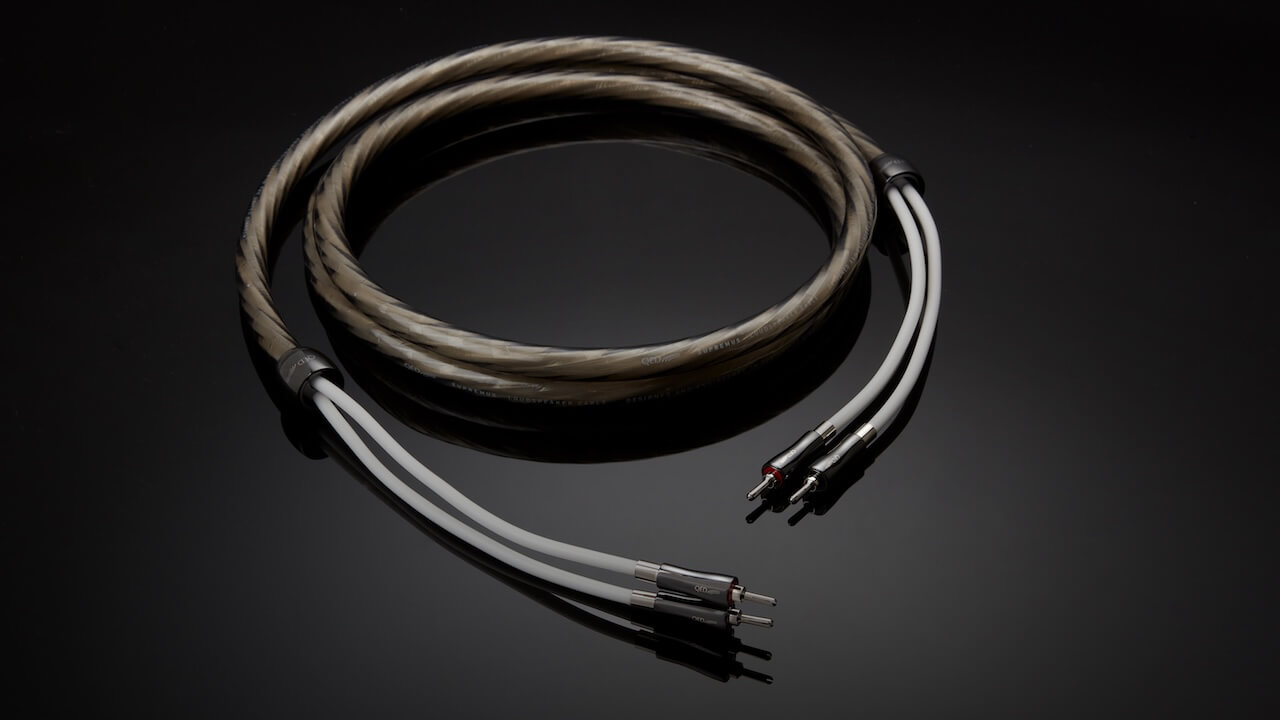If you ask anyone in the pro audio world, Shure’s award-winning microphones and headphones are something that almost everyone has used at some point.
Performance, durability, reliability, and value are second to none.
Audiophiles have used Shure’s phono cartridges for decades but the brand made the strategic decision to exit the cartridge market and there are no plans to return.
In 2025, Shure will celebrate its 100th birthday. That’s a rather astounding milestone and something it shares with only a handful of companies like Yamaha and Denon — which just celebrated its 111th birthday.
Shure was started in 1925 by Stanley N. Shure in Chicago as a radio parts and kit company and managed to navigate a global depression, WW II, and dozens of other shocks to the global economy.
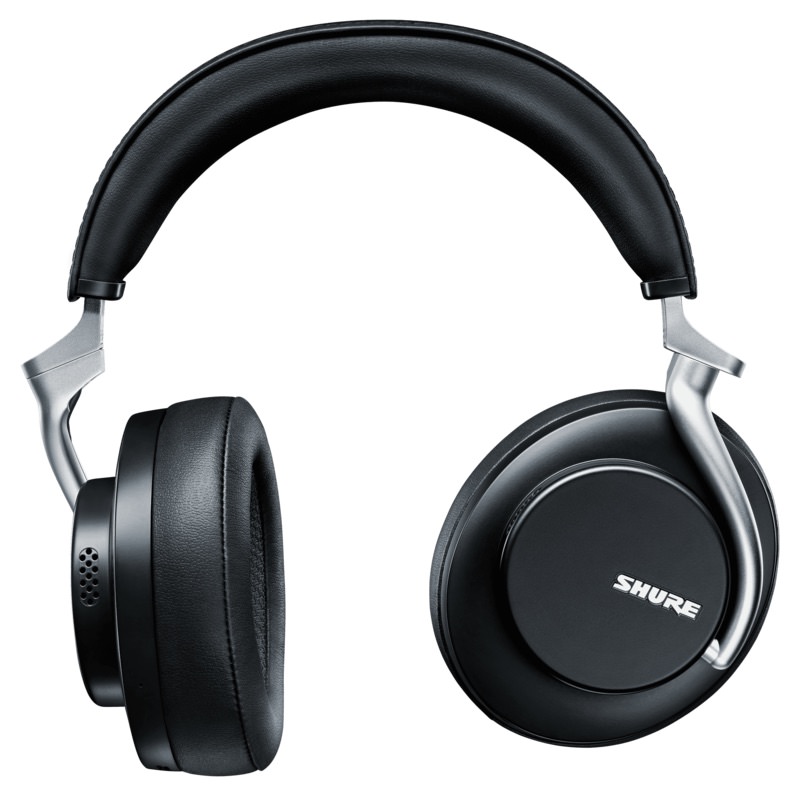
The introduction of the Shure AONIC 50 represented another interesting milestone for the company.
The brand’s presence in the headphone category began during WW II when it supplied both microphones and headphones to the U.S. Army and Navy.
At one point in the 1940s, Shure was the single largest manufacturer of phono cartridges in the United States supplying over a dozen manufacturers from their factories in Arizona and Mexico.
The brand was also an early pioneer in wireless communication for both the stage and office environments but stayed out of the Bluetooth segment until recently.
That all changed with the AONIC Series of Bluetooth headphones; some were a rebranding of existing Shure products with the integration of Bluetooth technology like the recently reviewed, Shure SE846 with wireless adapter.
With all of that history, it is fair to say that Shure and Beyerdynamic represent the OG of the category and both have remained deeply committed to the pro audio category where musicians, engineers, and broadcasters continue to use their products.
All of our podcasts are recorded and produced with Shure’s SRH-440A headphones and MV7 microphones.
Their IEMs have remained largely unchanged for over a decade and they generally do not introduce new models every single year. The introduction of new nozzle filters and color schemes for the SE846 Gen 2 IEMs made these otherwise superb earphones even better but that was the extent of the changes.
The Shure AONIC 50 have been available for over 3 years and whilst we had very high praise for them and still consider them to be excellent wireless headphones — 36 months is an eternity in the category and there are more than a handful of excellent competitive options from Bowers & Wilkins, Sennheiser, Sony, and Bose in the price range.
The Shure AONIC 50 Gen 2 are finally available and we took their latest for an extended test drive and commute across the country.
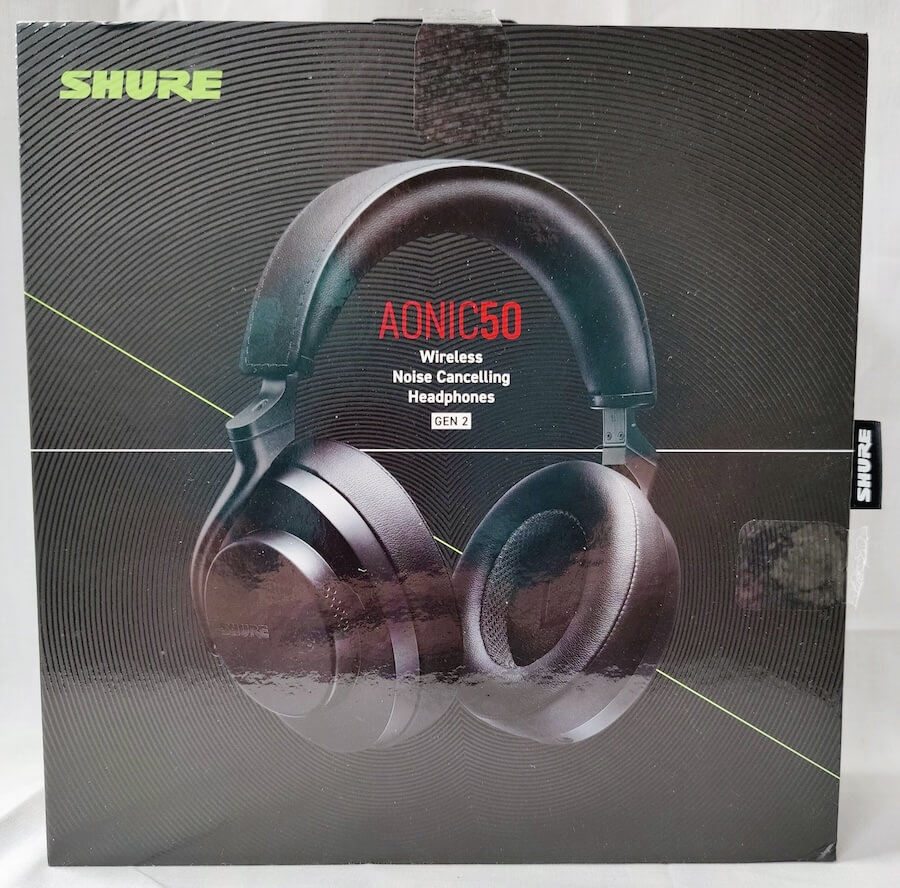
What’s New?
Very similar to the SE846 Gen 2, the external changes to the AONIC 50 Gen 2 are rather minimal; the latest iteration features a switch from brushed metal to anodized gimbals, but the ear cups, headband, controls, ear pads and cables remain the same.
The carrying case has been redesigned and is now much smaller; which made it easier to stick them inside my backpack or carry-on luggage when I flew for work.
Internally, the 50mm Dynamic driver has been retained but almost everything else is new.
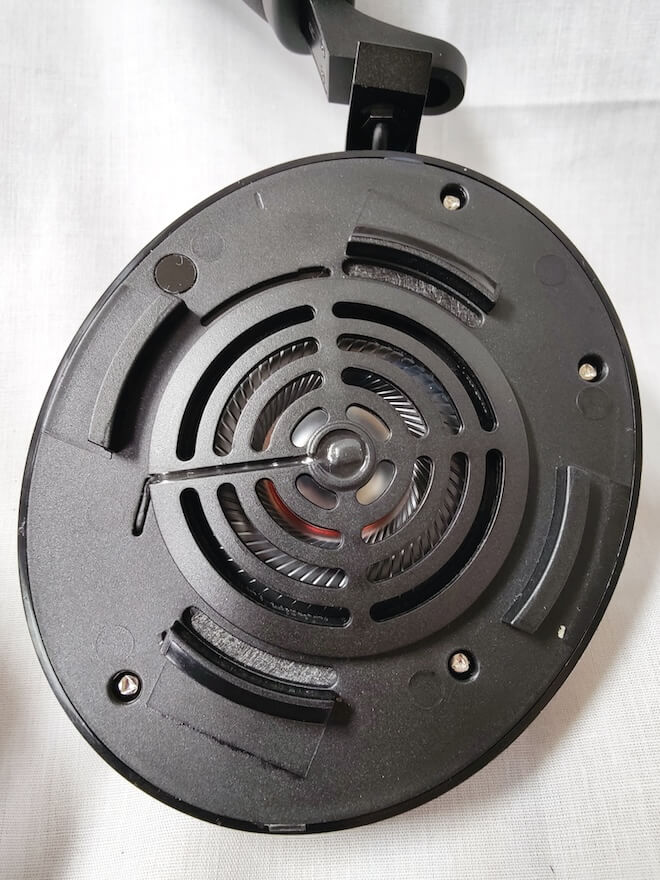
Bluetooth has been upgraded to version 5 and now supports aptX Adaptive, LDAC, and is Qualcomm Snapdragon Sound Certified.
New dynamic multipoint connectivity automatically switches to the most recent source.
Side-tone capability has been added for phone calls or podcast recording, which is a rather handy feature that allows you to hear your own voice through the headphones while speaking.
Shure has also improved the active noise cancellation (ANC) and transparency (environment) modes with a new hybrid model. They have also added three spatial audio modes.
One of the biggest changes involves the battery performance; over a period of two weeks, we averaged over 40 hours of playtime per charge with ANC engaged and turned off and using the other listening modes.
That is more than double the playing time of the original AONIC 50 and a rather substantial change to say the least. For those taking long flights or who commute from home every single day — the AONIC 50 Gen 2 are one of the better options we have tested so far in that regard.
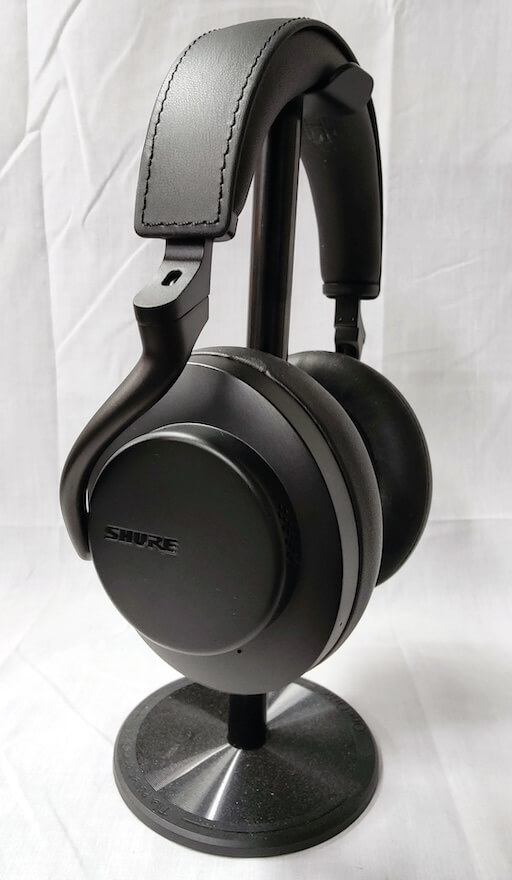
Comparison
| AONIC 50 | AONIC 50 GEN 2 | |
| Model | SBH2350 | MH36458 |
| Transducer Type | Dynamic, Neodymium magnet | Dynamic, Neodymium magnet |
| Frequency Response | 20 to 22,000 Hz | 20 to 22,000 Hz |
| Driver Size | 50 mm | 50 mm |
| Sensitivity @1 kHz | 97.5 dB/mW | 97.5 dB/mW |
| Impedance @1 kHz | 39 Ω | 39 Ω |
| Maximum Input Power | 100 mW | 100 mW |
| Bluetooth version | 5.0 | 5.0 |
| Supported Codecs | aptX, aptX HD, SBC, AAC, LDAC | aptX, aptX HD, SBC, AAC, LDAC |
| aptX Low Latency | aptX Voice aptX Adaptive | |
| Battery Life | Up to 20 hours | Up to 45 hours |
| Weight | 334 g (11.8oz.) | 334 g (11.8oz.) |
| Colors | Black, brown, white/tan | Black |
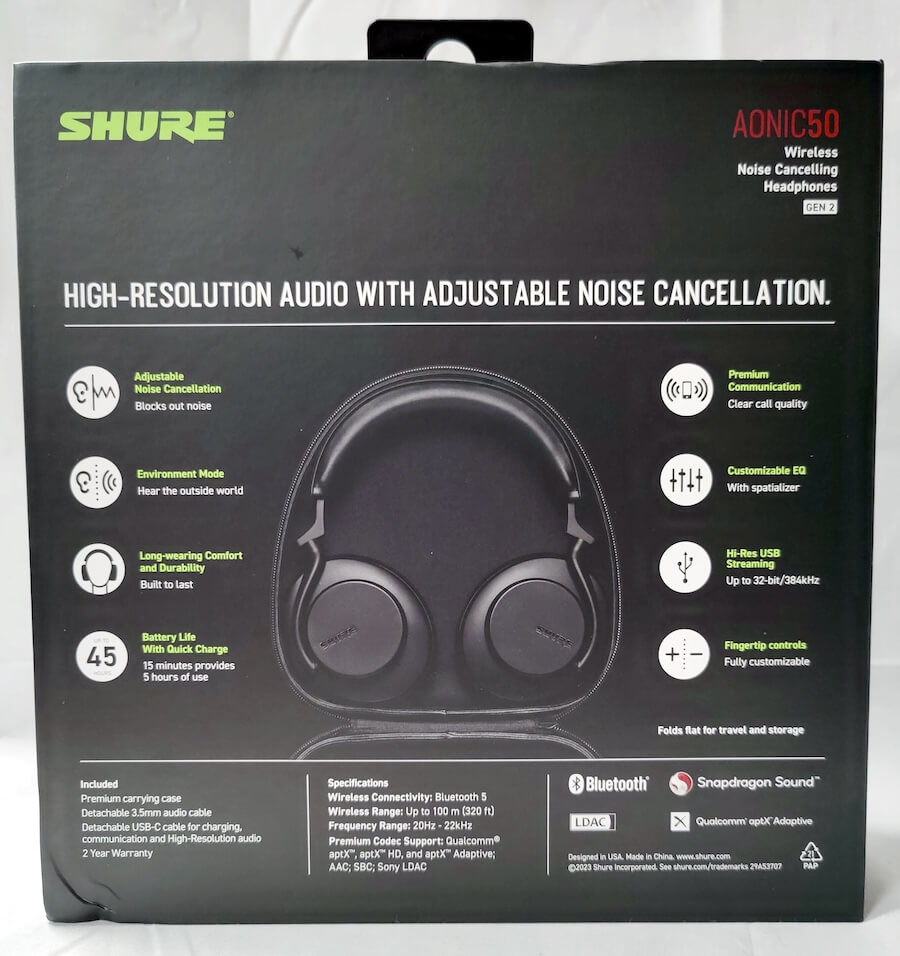
ANC Performance
The new hybrid ANC mode uses microphones both inside and on the ear cup to measure noise levels and adjust accordingly.
There are four levels of ANC performance available: light, moderate, max, and a new MaxAware mode that combines ANC and transparency.
Shure refers to MaxAware as the perfect on the go mode so car horns still cut through but road noise does not. Another win for situational awareness.
The benefit of this mode is that one can hear a conversation that begins at your office door, without having to filter through the conversations taking place behind the person speaking to you.
It worked rather well in my busy office and even when speaking to someone on the train that was filled with other commuters.
Environment mode offers ten adjustment levels to precisely tune out the outside world as desired. I found that to hear voices around the house at normal listening levels, I needed level 7 or 8 for it to be effective.
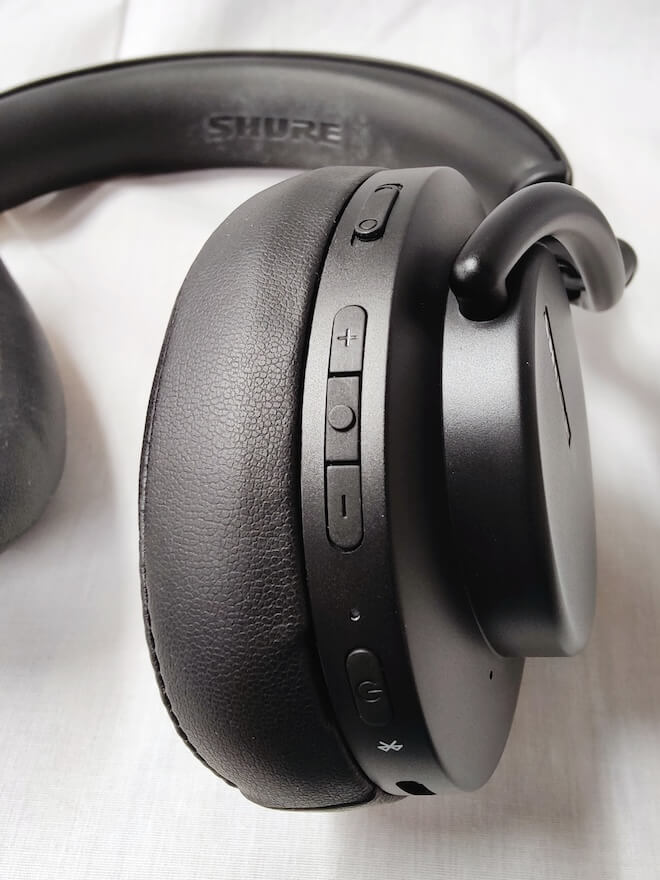
Controls
The controls are located along the the back of the right ear cup with only the 3.5mm connector on the left. The three-position switch on the right cup must be used to enable or disable the ANC and Environment modes.
The app allows fine adjustment of the active mode, but cannot switch between ANC, normal, and Environment mode. I found this somewhat confusing as the app has large buttons for mode, but they are for display only and are not touch enabled.
Spatial Audio
The spatial audio algorithm was designed by Shure engineers using a mix of acoustical modeling and critical listening to make sure the technical advancement was balanced to maintain sound quality while improving spaciousness.
There are three modes of spatial audio (Music, Cinema, and Podcast) available in addition to standard stereo output, with mode selection available via the app.
Music mode gives the headphone a more speaker-like performance by introducing a bit of cross-fade and wider stereo separation. The effect is subtle and doesn’t try to do too much, but is notable when A/B testing.
Cinema mode boosts the low end to add emphasis to explosions and bass heavy content, whilst also adding some emphasis in the midrange to boost dialogue.
Podcast mode enhances vocals and reduces other frequencies to ensure the presenter is “closer to your ears.”
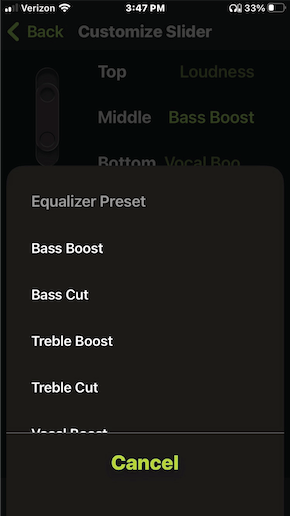
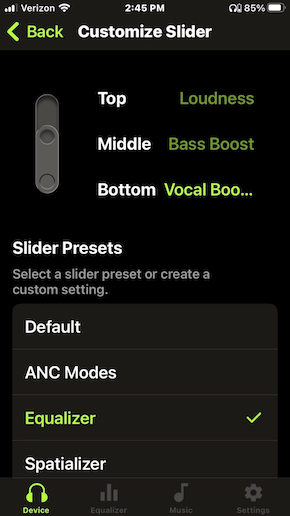
EQ
Users can create their own EQ presets with the 4-band parametric equaliser or the wide range of presets that are offered through the Shure Play app, including Bass Boost, Bass Cut, Treble Cut, Vocal Boost and Loudness. The AONIC 50 offer a better range of EQ options than a number of its competitors.
Sound Notes
Having recently listened to a pair of the original AONIC 50 wireless headphones, the first noticeable change was a rather significant emphasis in the low end with the sub-bass range exhibiting greater depth and impact.
The bass range of the AONIC 50 Gen 2 is fuller, tighter, and certainly more impactful; the mid-bass pulls back the reigns somewhat but there is no question that Shure have tuned these wireless headphones to push the bass range forward of the midrange.
Bass notes are clean overall and there was no bleed at all into the lower midrange.
The midrange starts off feeling somewhat recessed and there is a gradual uptick into the lower treble.
Male vocals are delivered with enough clarity and note weight but they do sound a step behind their female counterparts in the mix.
Guitar growl comes across as slightly muted and I found myself adjusting the parametric EQ to bring the midrange forward somewhat whilst reducing the lower treble.
There is a rise in the upper midrange and lower treble that does not peak until around 5kHz and I found it to be too much with the classical and rock recordings that I enjoy.
None of the preset EQ settings available in the Play app were preferable to the default tuning, although I did find the Treble Cut setting useful because of the aforementioned emphasis in the upper midrange and lower treble.
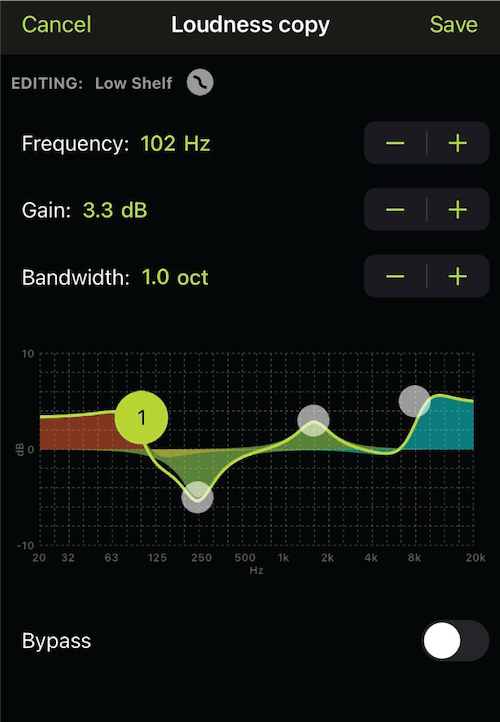
I was also able to customize the EQ using the Play app and a UAPP parametric add-on to perfect the signature to my liking. I created a lift around 400Hz with a width of roughly 50Hz on either side of about 4dB, which effectively helped bring the lower midrange into the same plane as female vocals and also brought the guitar further out into the mix.
The treble steps back after the lower range and extension is enough to add some air to the top. Top end extension, however, is somewhat limited which is to be expected from a closed-back ANC headphone.
Snare rattle was sharp and percussion snap was accurate sounding, but cymbals exhibited more energy than was necessary.
Shure gets top marks for including a rather effective parametric EQ that does make a difference. The AONIC 50 Gen 2 are one of the few wireless headphones that we have tried that respond well to the proper use of of EQ.
The soundstage performance is similar to the previous version, but with slighty more width than depth. Instrument separation is very good along with solid imaging performance.
Musicians are well defined in space but there is some stuttering when panning across the soundstage.
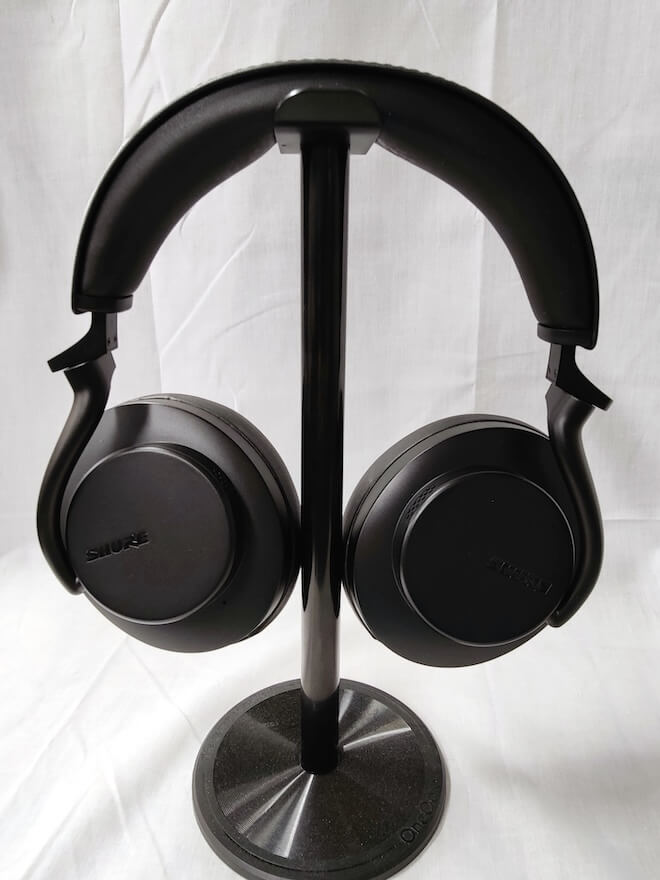
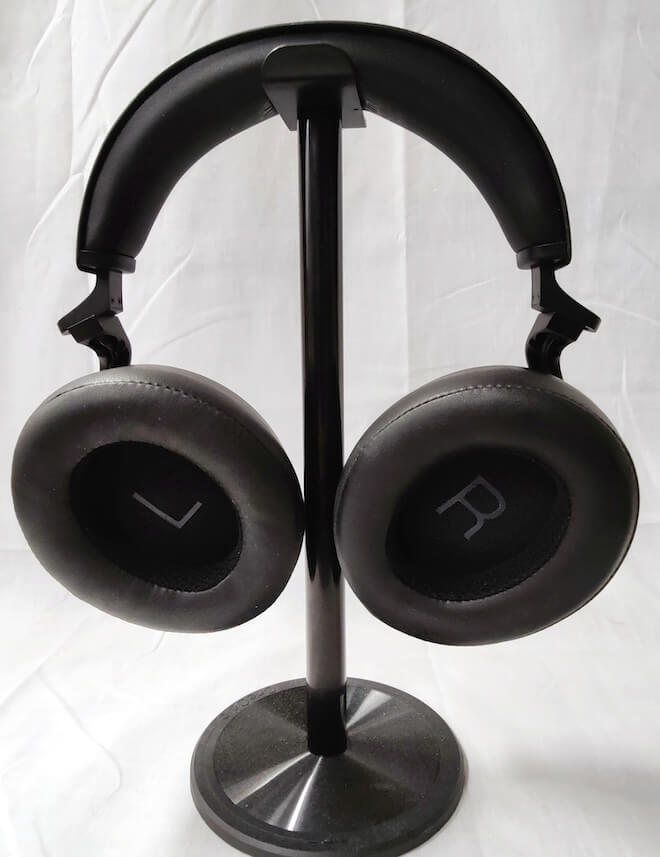
Taking the AONIC 50 Gen 2 with me to work was a generally positive experience; call clarity was good but we did notice some external noise during Teams and Zoom calls.
The ANC performance is also improved; low droning noises are cut off rather effectively but the performance is not as effective at higher frequencies. The AONIC 50 Gen 2 did a better job at cutting out sound from the TV in the same room and other high pitched sounds.
It also failed the screaming baby test on an airplane; which is actually the case for almost every high-end wireless headphone that we have tested over the years. Do not expect total silence when you fly.
I also appreciated the ability to use the AONIC 50 Gen 2 via wired connections for higher fidelity audio. It works via 3.5mm to 2.5mm (headphone end) or USB-C (or A) to USB-C (headphone end) cable.
Using the USB cable allows the Gen 2 to play up to and including 32-bit/384kHz PCM files natively rather than being downsampled by the Bluetooth codec.
The switch was not subtle; the clarity and detail retrieval improved significantly as a result of the change.
The 3.5mm to 2.5mm analog connector allows one to use an external DAC or headphone amplifier and the biggest change was in the lower midrange which was pushed further forward into the mix creating a more balanced sounding headphone.
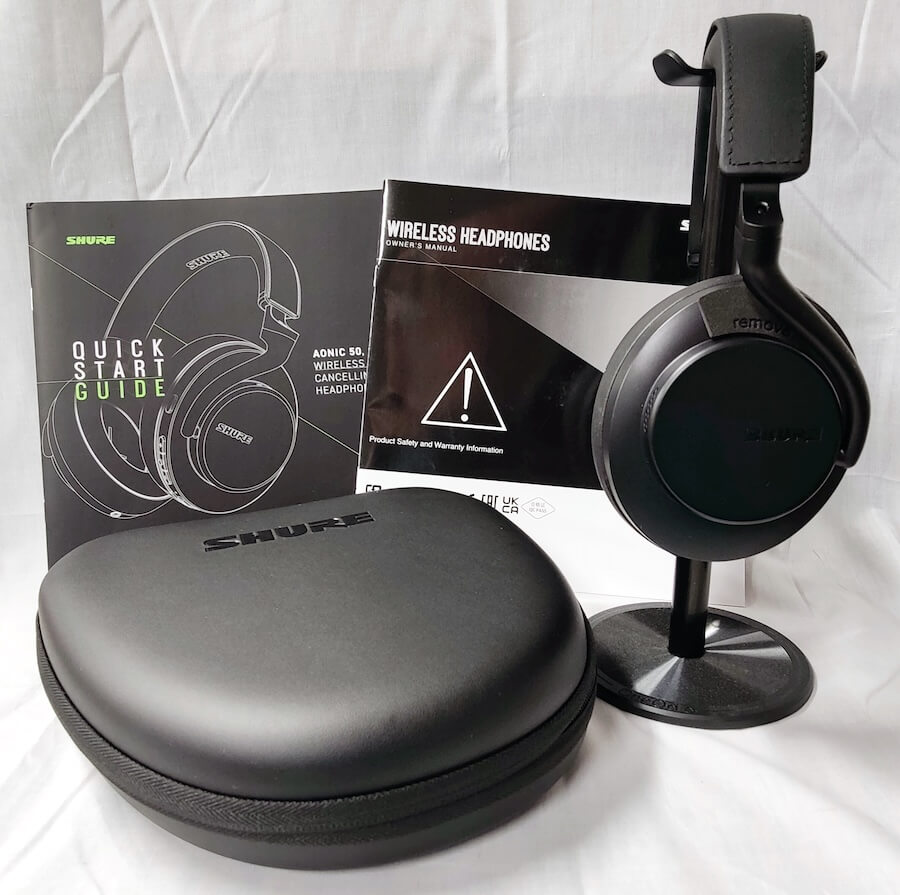
Final Thoughts
With so much competition in the wireless headphone category, the Shure AONIC 50 Gen 2 needed to offer something above and beyond to really stand out.
The battery performance, flexibility with digital and analog connections, build quality, and above average ANC performance make these a rather compelling option.
The sonic signature requires some EQ but the overall sound quality is certainly going to be popular with those who prefer a strong low end and emphasised upper midrange and lower treble.
It took very little effort using the 4-band parametric EQ to create a more neutral sounding presentation that I rather enjoyed.
The Shure AONIC 50 Gen 2 is competitive with models like the Sennheiser Momentum 4, Sony WF-1000XM5, Bose QC45, and JBL Tour One.
Shure have taken an already good pair of wireless headphones and improved their performance enough in a number of areas to warrant a strong look from those in the $300 to $400 range.
Where to buy: $349 at Amazon (only in black)
Related Reading:

